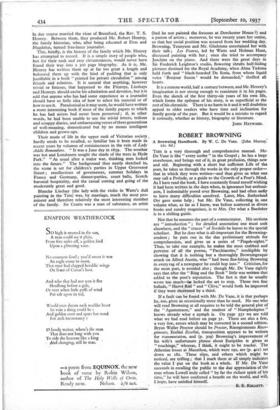ROBERT BROWNING Tins is a very thorough and comprehensive manual.
Mr. De Vane is like "every scribe" in the Gospel ; he has a large storehouse, and brings out of it, in great profusion, things new and old. Beginning with a short but sufficient Life of the poet, he takes us through the works in the only proper order— that in which they were written—and thus gives us what one may call a Prelude, or a guide to the Growth of a Poet's Mind. As I have read the book, I have constantly found myself wishing it had been written in the days when, in ignorance but enthusi- asm,1 indomitably pored over Browning, and had often sadly to leave many difficulties unsolved. Later, Mrs. Sutherland Orr gave some help ; but Mr. De Vane, collecting in one volume what, so far as I know, was before scattered in divers books and sundry magazines, is to Mrs. Orr what a Baedeker is to a shilling guide.
Not that he assumes the part of a commentator. His sections are " introduction " ; for detailed annotation one must seek elsewhere, and the " cruces " of Sordello he leaves to the special scholiast. But he does what is all-important for the Browning- student ; he puts one in the due preliminary attitude for comprehension, and gives us a series of "Pisgah-sights." Thus, to take one example, he makes the most crabbed and perverse of all the poems, "Pacchiarotto," intelligible by showing that it is nothing but a thoroughly Browningesque attack on Alfred Austin, who "had been flea-biting Browning in every rag of a newspaper he could hop into." Criticism, for the most part, is avoided also ; though Mr. De Vane rightly says that after the "Ring and the Book " little was written that added to the poet's reputation. The fact is that he usually wrote too much—hie lacked the art to stop. Those two fine ballads, " Herve_Riel " and "Clive," would both be improved if they were shortened by a third.
If a fault can be found with Mr. De Vane, it is that perhaps he, too, gives us occasionally more than he need. No one who will read Browning at all requires to be told the general plot of the "Agamemnon," and the student of " Numpholeptos " knows already what a nymph is. On page 352 we are told what we had read before on page 31. There are also a few, a very few, errors which may be corrected in a second edition. Bryan Waller Proctor should be Procter, Risorgiomento Risor- gimento, Ecelini Eccelini, transposition appears to be written for transmutation, and (p. 309) Browning's improvement of his wife's unfortunate phrase about Euripides is given as " touchings," whereas, I think, it ought to be touches. The Athenian losses at Marathon, which were 192, are (p. 401) set down as 182. These slips, and others which might be noticed, are trifling ; that I mark them at all simply indicates the value I put on the book as a whole. If Mr. De Vane succeeds in recalling the public to the due appreciation of the man whom Lowell truly called "by far the richest spirit of his time," he will have conferred a benefit on the world, and will,
hope, have satisfied himself.










































 Previous page
Previous page